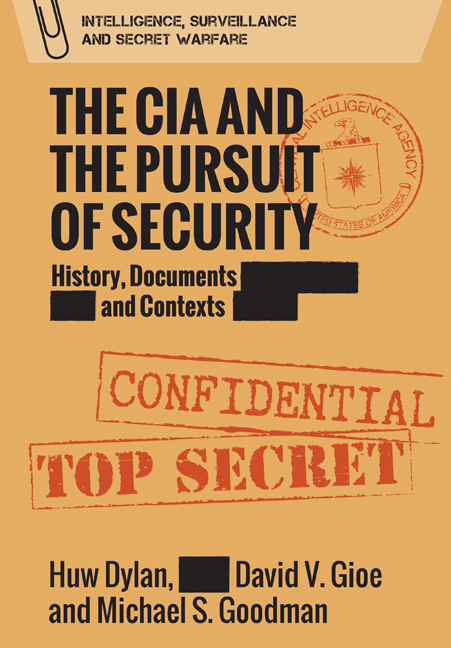Book contents
- Frontmatter
- Contents
- List of Documents
- Foreword
- Acknowledgements
- Introduction
- 1 Intelligence for an American Century: Creating the CIA
- 2 The Development of CIA Covert Action
- 3 A ‘Gangster Act’: The Berlin Tunnel
- 4 The CIA and the USSR: The Challenge of Understanding the Soviet Threat
- 5 Anglo-American Intelligence Liaison and the Outbreak of the Korean War
- 6 The CIA and the Bomber and Missile Gap
- 7 The CIA and Cuba: The Bay of Pigs and the Cuban Missile Crisis
- 8 The CIA in Vietnam
- 9 The CIA and Arms Control
- 10 The CIA’s Counter-Intelligence Conundrum: The Case of Yuri Nosenko
- 11 1975: The Year of the ‘Intelligence Wars’
- 12 Watching Khomeini
- 13 The CIA and the Soviet Invasion of Afghanistan
- 14 Martial Law in Poland
- 15 Able Archer and the NATO War Scare
- 16 The Soviet Leadership and Kremlinology in the 1980s
- 17 The CIA and the (First) Persian Gulf War
- 18 A Mole in Their Midst: The CIA and Aldrich Ames
- 19 ‘The System was Blinking Red’: The Peace Dividend and the Road to 9/11
- 20 Reckoning and Redemption: The 9/11 Commission, the Director of National Intelligence and the CIA at War
- 21 The ‘Slam Dunk’: The CIA and the Invasion of Iraq
- 22 The Terrorist Hunters Become Political Quarry: The CIA and Rendition, Detention and Interrogation
- 23 Innovation at the CIA: From Sputnik to Silicon Valley and Venona to Vault 7
- 24 Entering the Electoral Fray: The CIA and Russian Meddling in the 2016 Election
- 25 Flying Blind? The CIA and the Trump Administration
- Bibliography
- Index
14 - Martial Law in Poland
Published online by Cambridge University Press: 24 September 2020
- Frontmatter
- Contents
- List of Documents
- Foreword
- Acknowledgements
- Introduction
- 1 Intelligence for an American Century: Creating the CIA
- 2 The Development of CIA Covert Action
- 3 A ‘Gangster Act’: The Berlin Tunnel
- 4 The CIA and the USSR: The Challenge of Understanding the Soviet Threat
- 5 Anglo-American Intelligence Liaison and the Outbreak of the Korean War
- 6 The CIA and the Bomber and Missile Gap
- 7 The CIA and Cuba: The Bay of Pigs and the Cuban Missile Crisis
- 8 The CIA in Vietnam
- 9 The CIA and Arms Control
- 10 The CIA’s Counter-Intelligence Conundrum: The Case of Yuri Nosenko
- 11 1975: The Year of the ‘Intelligence Wars’
- 12 Watching Khomeini
- 13 The CIA and the Soviet Invasion of Afghanistan
- 14 Martial Law in Poland
- 15 Able Archer and the NATO War Scare
- 16 The Soviet Leadership and Kremlinology in the 1980s
- 17 The CIA and the (First) Persian Gulf War
- 18 A Mole in Their Midst: The CIA and Aldrich Ames
- 19 ‘The System was Blinking Red’: The Peace Dividend and the Road to 9/11
- 20 Reckoning and Redemption: The 9/11 Commission, the Director of National Intelligence and the CIA at War
- 21 The ‘Slam Dunk’: The CIA and the Invasion of Iraq
- 22 The Terrorist Hunters Become Political Quarry: The CIA and Rendition, Detention and Interrogation
- 23 Innovation at the CIA: From Sputnik to Silicon Valley and Venona to Vault 7
- 24 Entering the Electoral Fray: The CIA and Russian Meddling in the 2016 Election
- 25 Flying Blind? The CIA and the Trump Administration
- Bibliography
- Index
Summary
There is perhaps no greater value that an intelligence agency can provide than a well-placed, reliable source at a time of unrest and uncertainty. For an agency focused primarily on human intelligence (humint) like the CIA, having an agent in place, one who can be hurriedly tasked and has a rapid means of passing information, as a crisis develops, provides the best example of why it is invaluable to US policymaking. The events in Poland in early 1980 were a classic example of this. The episode is important not only as a case study in humint, but also because of how it presaged the growing nationalist sentiments and discontent within the Soviet Union that would come to mark the 1980s.
Poland had been one of the original and more involved nations within the communist, Soviet bloc. Throughout the 1970s food supplies in Poland, like many other places within Eastern Europe, became more and more stretched and so prices began to rise. Quite unrelated to this a movement began to grow within one of the main dockyards which, in late 1980, was crystallised into the first non-communist union, Solidarity. Amongst its major objectives was not to replace communism per se, but rather to foster support for the growing discontent at rising food prices, growing unemployment and the shrinking economy. As its membership swelled its focus began to shift, and increasingly it became a mouthpiece for anti-Soviet sentiments.
In Moscow the reaction was one of indecision and uncertainty, much as it had been with previous signs of discontent in the past. The leaders of the more hardline Satellite states urged a forceful response while Brezhnev dithered. Ultimately the answer came from within Poland itself: in late October 1980 the government began plans for imposing martial law. In Moscow there was general support for the Polish government and its decision. Unlike the previous instances in Hungary (1956), Czechoslovakia (1968) and Afghanistan (1979), this time around the government in question worked closely with the Kremlin in coordinating a response. The assurances provided by the government in Warsaw – that matters could be controlled without recourse to military intervention – persuaded Brezhnev to allow martial law to proceed.
- Type
- Chapter
- Information
- The CIA and the Pursuit of SecurityHistory, Documents and Contexts, pp. 226 - 263Publisher: Edinburgh University PressPrint publication year: 2020



